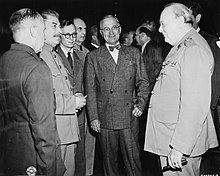|
26)THE RIGHT PLACE AT
THE RIGHT TIME
Britain
controlled 1947 Palestine and they stopped the Jewish immigrant ship
SS Exodus from arriving
in Palestine where Jews from all over Europe were hoping to form a new
Jewish state. World wide outrage resulted.
Britain would soon be leaving Palestine and a UN committee
had proposed the area be partition into Jewish and Arab states with
an economic union. Assistant Secretary of State Loy Henderson felt American
involvement would jeopardize oil supplies and the entire Arab world would
become America's enemy. President Truman's Jewess business associations
and good heart were to face off with his Midwestern anti-Semitics. |
FDR's former Treasury Secretary and unobservant Jew
Henry Morgenthau called Truman to complain about the
Exodus situation.
The Exodus, formerly President Warfield,
arriving at Haifa (British
Admiralty photo)

|
A
dyspeptic
Truman complained about Zionists in his diary. "
[Morgenthau had] no business calling me. The Jews have no sense of
proportion, nor do they have any judgment on world affairs... The
Jews, I find are very, very, selfish." They care not how many
Estonians, Latvians, Finns., Poles, Yugoslavs or Greeks get murdered
or mistreated... as long as the Jews get special treatment. Yet when they
have power--physical, financial, or political--neither Hitler nor
Stalin has anything on them for cruelty or mistreatment to the
underdog." Political
pressure
from both sides was immense.
|






 28) I AM
28) I AM 